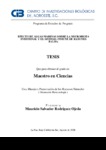| dc.contributor.advisor | Ascencio Valle, Felipe de Jesús | es_MX |
| dc.contributor.author | Rodríguez Ojeda, Mauricio Salvador | es_MX |
| dc.date.issued | 2008 | es_MX |
| dc.identifier.uri | http://dspace.cibnor.mx:8080/handle/123456789/229 | |
| dc.description.abstract | Las infecciones gastrointestinales causadas por virus, bacterias y parásitos provocan una gran variedad de enfermedades, tales como gastritis, úlceras pépticas, apendicitis, o colitis ulcerosa. La microbiota intestinal es la colección de organismos microscópicos que viven dentro de nuestro intestino, y esta lleva a cabo muchas funciones importantes para la salud del hospedador, como la absorción de nutrientes, soporte para el sistema inmunológico, y la habilidad de luchar contra los organismos causantes de enfermedades. Los factores que controlan la composición de la microbiota intestinal pueden ser fisicoquímicos, interacciones hospedador-bacteria e interacciones microbio-microbio. Un factor fisicoquímico importante son los nutrientes y dentro de estos están los prebióticos, ingrediente selectivamente fermentado que proporcionan cambios específicos, tanto en la composición y/o actividad en la microbiota gastrointestinal que confiere beneficios a la salud del hospedador. El objetivo de este trabajo es evaluar el efecto de algas marinas en la modulación de la microbiota bacteriana asociada a mucosa intestinal, actividad hidrolítica intestinal y determinar si con ello se estimula la respuesta inmune inespecífica mediada por la microbiota intestinal de ratones BALB/c. En este trabajo, ratones BALB/c se trataron diariamente (6 semanas) por vía oral con una suspensión de algas marinas (Eisenea arborea, Sargasum horridum, Phaeodactylum tricornutum, Dunalliella tertiolecta, Opuntia ficus-indica y Control), se sacrificaron cada 2 semanas 3 ratones por tratamiento y se tomaron muestras de sangre y placas de Peyer para análisis de expresión de ínterleucinas, así como de intestino para análisis microbiológico y enzimáticos. O. ficus-indica y E. arborea estimularon el crecimiento de especies de Lactobacillus y Bifidobacterium, P. tricornutum y E. arborea estimularon el crecimiento de especies de Enterobacterias y O. ficus-indica las inhibió. E. arborea, S. horridum y P. tricornutum estimularon el crecimiento de especies de Mesófilos aerobios. Solamente P. tricornutum no influyo en la diversidad de la microbiota. Además, se presentaron diferencias en los perfiles microbianos dependiendo del tipo de alga y en el tiempo. Las diferentes algas marinas influyeron en las actividades hidrolíticas del tipo fosfatasa alcalina, β-galactosidasa, β-glucosidasa, fosfatasa acida, valina arilamidasa, esterasa C4. E. arborea y P. tricornutum presentaron una tendencia a aumentar la producción de IL-10 antiinflamatoria y P. tricornutum, D. tertiolecta y O. ficus-indica a la producción de TNF- proinflamatoria del sistema inespecífico. Las algas marinas influyeron tanto en la microbiota intestinal bacteriana, así como en la actividad hidrolítica intestinal. En este trabajo no se presentaron claras diferencias en la expresión de citocinas intestinales. | es_MX |
| dc.language.iso | es | es_MX |
| dc.publisher | Centro de Investigaciones Biológicas del Noroeste, S.C. | es_MX |
| dc.title | Efecto de algas marinas sobre la microbiota intestinal y el sistema inmune de ratones Balb/c | es_MX |
| dc.documento.id | cibnor.2008.rodriguez_m | es_MX |
| dc.documento.indice | rodriguez_m | es_MX |
| dc.documento.inst | cibnor | es_MX |
| dc.dirtesis.grado | Maestría en Ciencias en el Uso, Manejo y Preservación de los Recursos Naturales | es_MX |
| dc.dirtesis.disciplina | Biotecnología | es_MX |
| dc.dirtesis.universidad | Centro de Investigaciones Biológicas del Noroeste, S.C. | es_MX |
| dc.dirtesis.facultad | Posgrado en Recursos Naturales | es_MX |
| dc.documento.fecha | Agosto, 2008 | es_MX |
| dc.description.abstracten | Gastrointestinal infections caused by virus, bacteria and parasites cause a great variety of diseases, such as gastritis, peptic ulcers, appendicitis, or ulcerous colitis. The intestinal microbiota is the collection of microscopic organisms that they live inside our intestine, and this it carries out many important functions for the health of the host, as the absorption of nutritious, support for the immunologic system, and the ability of fighting against the causing organisms of illnesses. The factors that control the composition of the intestinal microbiota can be physiochemical, interactions host-bacteria and interactions microbe-microbe. An important physiochemical factor is the nutrients like prebiótics, that are ingredient selectively fermented that they provide specific changes, so much in the composition and/or activity in the gastrointestinal microbiota that confers benefits to the health of the host. The aim of this work is to evaluate the effect of marine algae in the modulation of the bacterial mucosa-associated microbiota, intestinal hydrolytic activity and to determine if is stimulated the immune innate response mediated by the intestinal microbiota of mice BALB/c. In this work the mice BALB/c was daily (6 weeks) for via oral with a suspension of marine algae (Eisenea arborea, Sargasum horridum, Phaeodactylum tricornutum, Dunalliella tertiolecta, Opuntia ficus-indica), every 2 weeks they were sacrificed and took samples of blood and Peyer’s patches for analysis of cytokine expression, as well as of intestinal mucosa tissue for microbiologic and enzymatic assay. O. ficus-indica and E. arborea stimulated the growth of species of Lactobacilli and Bifidobacterium, P. tricornutum and E. arborea the growth of species of Enterobacteria and O. ficus-indica inhibited them. E. arborea, S. horridum and P. tricornutum stimulated the growth of species of aerobic mesófils. Only P. tricornutum doesn't influence in the diversity of the microbiota. Differences were also presented in the microbial profiles depending on the alga type and in the time. Did the algae modulate the activity intestinal hidrolítica with main action in the stimulation of the activity alkaline phosphatase, β-galactosidase, esterase (C 4) and esterase lipase (C 8) and the decrease activity of β-glucosidasa, acid phosphatase, leucin arilamidase and valin arilamidasa. E. arborea and P. tricornutum presented a tendency to increase the production of IL-10 anti-inflammatory cytokine and P. tricornutum, D. tertiolecta and O. ficus-indica to the production of TNF- pro-inflammatory cytokine of the innate immune system. The marine algae modulated the intestinal microbiota in enterobacteria and aerobic mesófils counts, but they stimulated the metabolism of the lactic acid bacteria (Lactobacillus and Bifidobacterium). | es_MX |
| dc.documento.subject | Algas marinas; prebióticos; microbiota asociada a mucosa; enzimas hidrolíticas; citocinas; ratón | es_MX |

